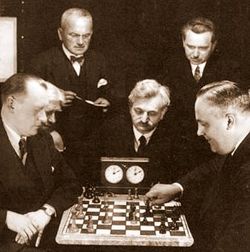
So way back in the 1930’s when Alekhine was the world chess champion, having recently defeated the great Capablance for the world title, he was asked whether any guaranteed winning strategy might ever be discovered for the great engima of the game of chess. He replied with a story.
He related that some years before he had been in a hotel room getting ready for a tournament the next day and as such he was hoping for an early night. It was stormy outside and the branches pattered against the window and so it took him some time to recognize the tapping on the door as that of a human.
He opened his door wearily and there on the balcony stood a tramp. His hair was unwashed, he was dressed in an old suit with patches and he hadn’t shaved in days.
“I can beat you in 9 moves!” the tramp told him.
Alekhine examined the man, decided that he was delusional but not dangerous and tried to close the door but the tramp placed his foot in the doorway and insisted:
“No, really, i can beat you in 9 moves!”
“Is it money you want?” Alekhine asked with a sigh, “I might have a few coins on my bedside table.”
“Just set up the pieces – you’ll see!”
Finally, Alekhine shrugged in exasperation. “If I play you will you go away?”
The tramp nodded and then shuffled inside to where a table was already set up, Alekhine having been practicing openings earlier in the night. The world champion pulled up a chair for the tramp wearily, hoping the smell he brought with him wouldn’t linger once he was gone. Then Alekhine sat down opposite him, began the game and… lost in 9 moves.
Rubbing the sleep from his eye he scowled at the smirk now hosted by the tramp’s face and demanded a rematch. But once again, the unwelcome visitor defeated him at once. Alekhine was now profoundly disturbed and hurried out of the room and down the hallway where the former champion, Capablanca, was lodged in preparation for a tournament. Capablanca was tired and moody, not feeling too well-disposed towards Alekhine since losing the title but finally agreed to give in to his rival’s caprice and shuffled down the corridor to play the tramp.
Capablanca, too, lost in 9 moves.
“So what did you do?” the other guests at the party asked Alekhine. He shrugged.
“We killed him, of course.”
The World of Chess
 When I was young I was pretty good at chess. I was the captain of the school team and a couple of very kind teachers took me to tournaments and to play for their club against adults across the county. It was a world almost entirely made up of men and mostly old men at that. Club matches were silent affairs in rooms resembling classrooms, plastic chairs and dominated by the eerie sound of chess clocks ticking away asynchronously. The old men dressed badly, sometimes sucked boiled sweets to put you off and we spoke little other than to ask each other’s names and ranking at the beginning of the match for our little chess notebooks where we recorded our moves for future analysis.
When I was young I was pretty good at chess. I was the captain of the school team and a couple of very kind teachers took me to tournaments and to play for their club against adults across the county. It was a world almost entirely made up of men and mostly old men at that. Club matches were silent affairs in rooms resembling classrooms, plastic chairs and dominated by the eerie sound of chess clocks ticking away asynchronously. The old men dressed badly, sometimes sucked boiled sweets to put you off and we spoke little other than to ask each other’s names and ranking at the beginning of the match for our little chess notebooks where we recorded our moves for future analysis.
It was a tense and geeky world of stumbling social interaction during the breaks, populated by nervous, stammering personalities whose natural awkwardness was only aggravated by the mental tension of conducting silent battles of life and death across a board with 64 squares and a little clock indicating how long you had until your flag would fall.
Chess players were almost necessarily eccentric. I recall one strong player at our club with greasy hair, dematitus and a old flannel suit; he worked in the post office during the day where he wouldn’t acknowledge that you’d ever met before but would become loud and flamboyant in the evenings at the club, crying out Schach! when he placed you in check.
Or there was the brilliant QC lawyer who walked into the tuckshop of our school where a tournament was being held and treated the ladies working behind the counter to a booming rendition of Flintstones! We’re the Flintstones! The year before he had been gently escorted out after miaowing like a cat for 20 minutes by the coffee machine.
It clearly wasn’t cool to be a chess player but there was something wonderful about being in the company of all these people who shared a love for the game of chess. It was like life condensed onto a board – life with rules, definable strategies and yet no way to be sure of winning. We were in the presence of a mystery, an enigma that might never be solved. I read books that asked rhetorically whether chess was an art or a science and the play of the grandmasters was described as elegant or dashing.
The Perfect Move
I had a chess program on my computer but I could beat it a good part of the time and I never imagined it would become a serious threat to the greats. There were more possibilities in the first 3 moves of a game of chess than atoms in the universe, I was told. Or something like that. And as there were millions more processes happening in the human brain that in the universe, it seemed like the perfect match.
I wonder if Kasparov once thought so, too.
In 1997, Kasparov lost a match against the IBM Deep Blue chess machine and though Kasparov alleged that IBM had cheated, it was clear that even if it had not already arrived, the day would eventually come when humans could no longer compete with machines.
I’d like to say that’s why I gave up chess. Really, of course it was because I wanted to expand my social horizons from the world of late evenings with badly-dressed old men slurping tea and making chess quips. I had also started smoking marijuana and though I gave it up after a couple of years, my sharpness on the board had been blurred for life.
But I also intuited, long before the invention of smart phones, that as big as the possibilities were, eventually a computer would be devised that would know beyond any doubt what was the best move to make in any situation. Just picture it: 2025, you’re sat across a chess board from some idiot who’s playing Angry Birds 5 on his Iphone 16, you’re sweating through the complications of a Queen’s pawn attack, while he just consults his Chess For Dummies app every few minutes.
And that – unless chess inexplicably starts attracting lots of nubile females in the 20’s to start playing – is why I’ll never go back to the game.









